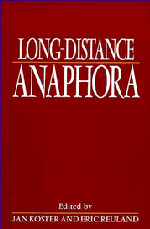Book contents
- Frontmatter
- Contents
- List of contributors
- Preface
- 1 Long-distance anaphora: an overview
- 2 Containment and connectedness anaphors
- 3 Long-distance reflexives and the typology of NPs
- 4 Contextual determination of the anaphor/pronominal distinction
- 5 On the interaction between antecedent-government and binding: the case of long-distance reflexivization
- 6 Binding in Polish
- 7 Anaphors in binary trees: an analysis of Czech reflexives
- 8 Latin long-distance anaphora
- 9 Prepositions, binding and θ-marking
- 10 Locality, parameters and some issues in Italian syntax
- 11 Long-distance binding in Finnish
- 12 The primacy condition of anaphora and pronominal variable binding
- 13 The local nature of the long-distance reflexive in Chinese
- 14 Anaphors and logophors: an argument structure perspective
- References
- Index
10 - Locality, parameters and some issues in Italian syntax
Published online by Cambridge University Press: 01 June 2011
- Frontmatter
- Contents
- List of contributors
- Preface
- 1 Long-distance anaphora: an overview
- 2 Containment and connectedness anaphors
- 3 Long-distance reflexives and the typology of NPs
- 4 Contextual determination of the anaphor/pronominal distinction
- 5 On the interaction between antecedent-government and binding: the case of long-distance reflexivization
- 6 Binding in Polish
- 7 Anaphors in binary trees: an analysis of Czech reflexives
- 8 Latin long-distance anaphora
- 9 Prepositions, binding and θ-marking
- 10 Locality, parameters and some issues in Italian syntax
- 11 Long-distance binding in Finnish
- 12 The primacy condition of anaphora and pronominal variable binding
- 13 The local nature of the long-distance reflexive in Chinese
- 14 Anaphors and logophors: an argument structure perspective
- References
- Index
Summary
Introduction
The issues discussed in this chapter lie at the intersection of two lines of inquiry. The first line of inquiry can be characterized as a search for theories of locality under which all or some of the locality conditions can be given a unified formulation. One such theory, presented in Manzini (1988, 1989), is partially summed up in section 2. A crucial feature of the theory is that sentential subjects are generated in a non-VP-external position. This allows for the empty category principle (ECP) and binding theory to be unified under the same definition of locality, one that does not mention the notion of subject.
The second strand of the discussion is related to recent theories of parametrization in binding theory. Section 2 briefly sums up the theory presented in Manzini & Wexler (1987) and in Wexler and Manzini (1987), according to which parametrization effects are due to the presence of a parameter, or multiple disjunction, in the definition of locality.
The central proposal in this chapter is that the subject-based definition of locality in Chomsky (1981) and the non-subject-based definition under which ECP and binding theory are unified are not mutually exclusive; rather, the two definitions represent coexisting values of the locality parameter. Anaphors such as English himself, but also Italian se stesso, etc., are associated with the subject-based value.
- Type
- Chapter
- Information
- Long Distance Anaphora , pp. 209 - 230Publisher: Cambridge University PressPrint publication year: 1991



